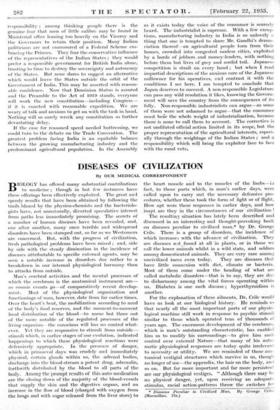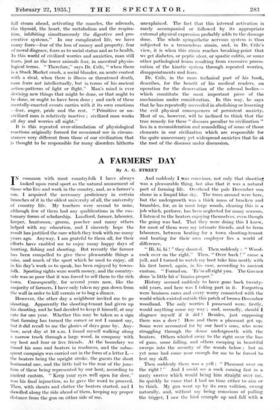DISEASES OF CIVILIZATION
By OUR MEDICAL CORRESPONDENT
BIOLOGY has offered many substantial contributions to medicine ; though in but few instances have these offerings been effectively exploited. The great and speedy results that have been obtained by following the trails blazed by the physico-chemists and the bacteriolo- gists have, not unnaturally, diverted speculative interest from paths less immediately promising. The secrets of a number of human diseases have been revealed, and, one after another, many once terrible and widespread disorders have been stamped out, so far as we Westerners are concerned. But, with the progress of civilization, fresh pathological problems have been raised ; and, side by side with the steady diminution in the incidence of diseases attributable to specific external agents, may be seen a notable increase in disorders due rather to a breakdown in our internal physiological harmony than to attacks from outside.
Man's cerebral activities and the mental processes of which the cerebrum is the anatomical instrument are- as cosmic events go—of comparatively recent develop- ment. Most of the physiological organization and functionings of man, however, date from far earlier times. Over the heart's beat, the mobilization according to need of the body's food reserves, and the moment-to-moment local distribution of the blood—to name but three out of the 'mire notable of the regulated processes of the living organism—the conscious will has no control what- ever. Yet they arc responsive to stimuli from outside— stimuli which, in earlier stages of our evolution, indicated happenings to which these physiologiCal reactions were defensively appropriate. In the presence of danger, which in primaeval days was crudely and immediately physical, certain glands within us, the adrenal bodies, discharge into the blood-stream a potent drug, adrenafin, forthwith distributed by the blood to all parts of the body. Among the prompt results of this auto-medication are the closing down of the majority of the blood-vessels that supply the skin and the digestive_ organs, and an increase in the flow of blood (charged with oxygen from the lungs and with sugar released from the liver store) to the heart muscle and to the muscles of the limbs—in fact, to those parts which, in man's earlier . days, were called upon to carry out the necessary defensive pro- cedures, whether these took the form of fight or of flight. How apt were these responses in earlier days, and how inapt are they in the circumstances of our civilization The resulting situation has lately been described and discussed in an interesting and thought-provoking book on diseases peculiar to civilized man,* by Dr. George Crile. There is a group of disorders, the incidence of which increase3 with the advance of civilization. They are diseases not found at all in plants, or in those we call the lower animals whilst in a wild state, and seldom among domesticated animals. They are very rare among uncivilized races even today. They are diseases that have little connexion with diet, climate or bacteria. Most of them come under the heading of what are called metabolic disorders—that is to say, they are due to disharmony among the vital forces operating within us. Diabetes is one such disease ; hyperthyroidism is another.
For the explanation of these ailments, Dr. Crile would have us look at our 'biological history. He reminds us that nearly all the most important parts of our physio- logical machine still work in response to psychic stimuli similar to those which operated tens of thousands of years ago. The enormous development of the cerebrum, which is mah's outstanding characteristic, has enabled him so to modify his surroundings—to give. him such control over external Nature—that many of . his auto- matic physiological responses are today quite irrelevant to necessity or utility. We are reminded of those ana- tomic.al vestigial structures which survive in us, though no longer of use—the appendix, the hair on the body, and so on. But far more important and far more persistent are our physiological vestiges. " Although there may be no physical danger, yet, upon receiving an adequate stimulus, racial action-patterns throw the switches for * Diseases Peculiar, to Civilized Man. By George erne. (Macmillan. 21s.) full steam ahead, activating the muscles, the adrenals, the thyroid, the heart, the metabolism and the respira- tion, inhibiting .simultaneously the digestive and pro- creative systems." In our complicated life, we have many fears—fear of the loss of money and property, fear of moral disgrace, fears as to social status and as to health. In this world of civilized worries and anxieties, man still fears, just as the lower animals fear, in ancestral physio- logical terms. "Therefore," says Dr. Crile, "when there is a Stock Market crash, a social blunder, an acute contest with a rival, when there is illness or threatened death, man fears not intellectually, but in terms of his ancient action-patterns of fight or flight." Man's mind is ever devising new things that might be done, or that ought to be done, or ought to have been done ; and each of these mentally-enacted events carries with it its own emotions —fear, anger, pride and the rest. "Primitive or un- civilized man is relatively inactive ; civilized man works all day and worries all night."
It is this repeated over-stimulation of physiological reactions- originally formed for occasional use in circum- stances very different from those of our civilization that is thought to be responsible for many disorders hitherto unexplained. The fact that this internal activation is rarely accompanied or followed by its appropriate external physical expression probably adds to the damage 'done. The whole sympathetic nervous system is thus 'subjected to a tremendous strain, and, in Dr. Crile's -view, it is when this strain reaches breaking-point that we get diabetes, or peptic ulcer, or spastic colitis, or some other pathological lesion *resulting from excessive provo- cation of the kinetic system through repeated worries, 'disappointments and fears.
Dr. Crile, in the more technical part of his book, describes, for the benefit of his medical readers, an .Operation for the denervation of the adrenal bodies— which constitute the most important piece of the mechanism under consideration. In this way, he says that he has repeatedly succeeded in abolishing or lessening the evil physical consequences of persistent anxiety. Most of us, however, will be inclined to think that the true remedy for these "diseases peculiar to civilization" lies in a reconsideration and remodelling of some of those elements in our civilization which are responsible for the quite unnecessary yet widespread anxieties that lie at the root of the diseases under discussion.



















































 Previous page
Previous page